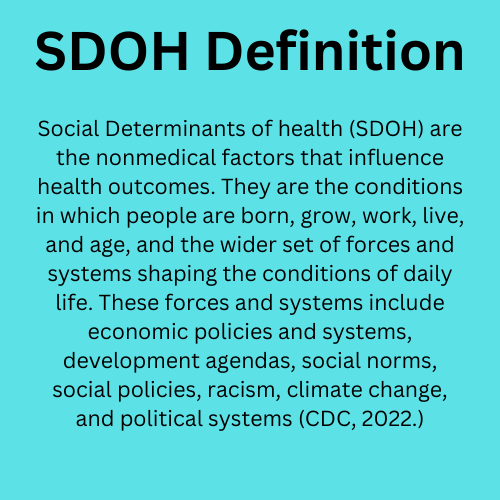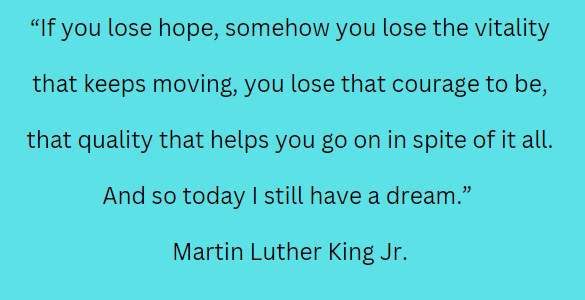Home > PTTC Post Article - January 2023
By Cele Fichter-DeSando, MPM
“Life’s most persistent and urgent question is what are you doing for others?”
-Martin Luther King Jr.
January 16, 2023
Each year, on the third Monday in January, Americans have the opportunity to celebrate the life and work of Martin Luther King, Jr. According to the National Constitution Center (NCC), the Martin Luther King Jr. federal holiday was first approved in 1983. In 2000, it was made a state holiday in all 50 states. The federal holiday serves multiple purposes: to honor the total legacy of Dr. King; to focus on the issue of civil rights; to highlight the use of nonviolence to promote change and to call people into public service (NCC 2022.) The King Center has designated the theme for the King Holiday 2023 as “It Starts with Me: Cultivating a Beloved Community Mindset to Transform Unjust Systems.”
Occurring at the beginning of the year, The Martin Luther King Day observance affords the opportunity for prevention professionals to recommit to providing universal prevention services for all people in all settings. Providing effective prevention services for all people requires using research and evidence to combat racism and injustice, reduce health disparities and promote health equity.

Prevention interventions can prioritize populations at elevated risk for substance use disorders (SUDs) and those who experience the effects of substance misuse. Research-based programs and interventions can address social determinants of health (SDOH) including structural racism that creates inequities in housing, access to health and social services, food, and employment. New and existing research can also assist in ensuring that prevention and treatment interventions do not increase or support inequities and are effective and accepted by different gender, racial, and ethnic groups (Blanco et al 2022.)
To meet the need for high-quality resources about racism, anti-racism, and advancing health equity for Black, Indigenous, Latinx, and other communities of color affected by unhealthy substance use and SUD treatment a new resource The Intersection of Addiction and Racism: A Curated Bibliography is being developed for 2023. A collaboration between the Prevention Technology Transfer Center (PTTC) Network Coordinating Office, the Association for Multidisciplinary Education and Research in Substance use and Addiction (AMERSA,) and the Addiction Technology Transfer Center (ATTC) Network Coordinating Office the bibliography will bring together new and landmark papers, books, and multimedia resources into one place to help advance knowledge and improve health outcomes. Included in the collection will be resources related to health disparities, SDOH, and Diversity, Equity, and Inclusion ( DEI ) in the provision of SUD prevention, treatment, and recovery (PTTC, 2022.)
As a new early-childhood teacher back in the 1980’s I learned that after the winter break both the children and adults were restless, inattentive, and in need of a reset. January became the time to try something new within the existing structure: redesign the classroom, offer creative activities, and provide opportunities for interaction and engagement in a safe space. January is a perfect opportunity for prevention programs to focus on new and creative ways to use available research to provide comprehensive prevention equity-driven approaches in safe environments.
One way to provide comprehensive equity-driven programs in prevention is by addressing the SDOH. Centers for Disease Control and Prevention (CDC) focuses on SDOH because “addressing differences in SDOH makes progress toward health equity, a state in which every person has the opportunity to attain their highest level of health (CDC, 2022.)” CDC has adopted the World Health Organization's definition for SDOH.
Prevention (CDC) focuses on SDOH because “addressing differences in SDOH makes progress toward health equity, a state in which every person has the opportunity to attain their highest level of health (CDC, 2022.)” CDC has adopted the World Health Organization's definition for SDOH.
The Carnevale Associates, a Maryland-based organization that provides strategic consulting in behavioral health and criminal justice lists the SDOH as among the primary drivers of health disparities and health inequities. In the info brief Addressing the Social Determinants of Health in Substance Use Prevention, the Carnevale authors have outlined several steps for substance use prevention professionals to address the SDOH.
Prevention professionals can become one voice across many organizations to work for supportive housing or employment, health care services in underserved areas, and efforts to combat racism and discrimination (Carnevale, 2021.)
Universal prevention messaging and efforts can begin on day one of the New Year 2023 but do not have to be completed in one day. The challenge is to set goals and programs that can be used each day throughout the year to provide evidence-based programming that engages the community in its selection, design, and implementation and pursues social justice, equity, and inclusion for everyone.

Cele Fichter-DeSando, MPM
CFD Consulting, LLC
[email protected]
412-580-3089
References
Blanco, C., Kato, E., Aklin, W., Tong, S., Bierman, A., Meyers, D., and Volkow, N. (2022). Research to Move Policy-Using Evidence to Advance Health Equity for Substance Use Disorders. The New England Journal of Medicine, June 16, 2022; 386:2253-2255. https://doi.org/10.1056/NEJMp2202740
Carnevale Associates, LLC. 2022. Addressing the Social Determinants of Health in Substance Use Prevention. Info Brief, June 2021. https://www.carnevaleassociates.com/file_download/inline/c18c74f3-26a8-440a-ab9b-c5fb6949bb87
Centers for Disease Control and Prevention (CDC.gov. 2022.) Social Determinants of Health at CDC. Last Reviewed: December 8, 2022. Retrieved December 15, 2022.
https://www.cdc.gov/about/sdoh/index.html
Centers for Disease Control and Prevention (CDC.gov. 2022.) Why is Addressing Social Determinants of Health important for CDC and Public Health? Last Reviewed: December 8, 2022. Retrieved December 15, 2022. https://www.cdc.gov/about/sdoh/addressing-sdoh.html
Prevention Technology Transfer Center (PTTC) Network Control Office (NCO), 2022. The Intersection of Addiction and Racism: A Curated Bibliography 2022. https://pttcnetwork.org/centers/global-pttc/intersection-addiction-and-racism-curated-bibliography